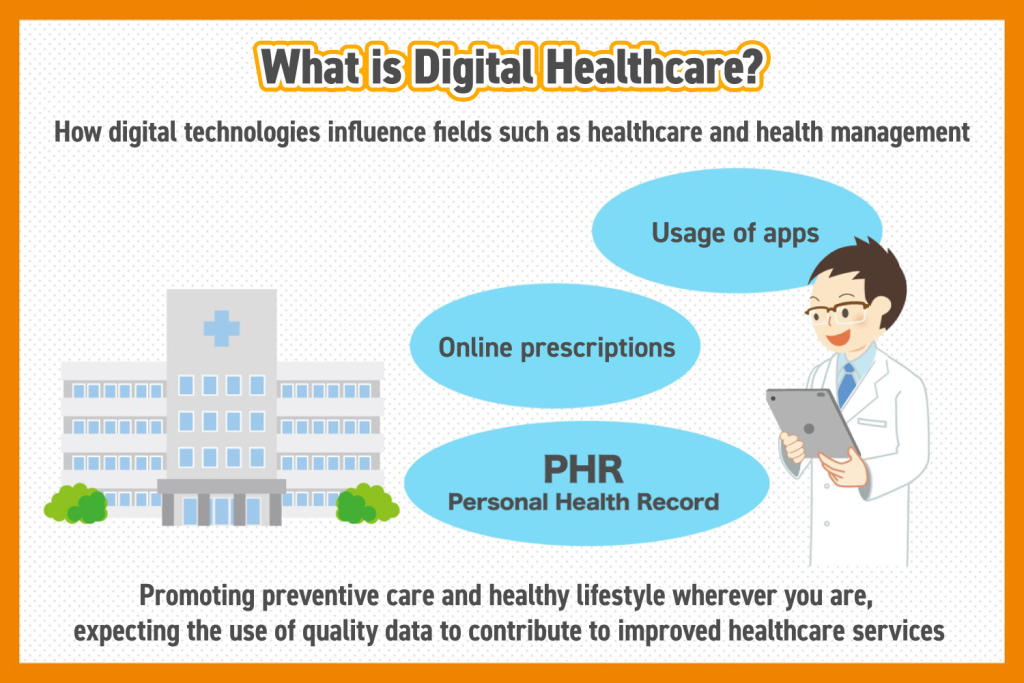What is Digital Healthcare? Explaining the Importance, Challenges, and Technologies Used
Digital healthcare refers to the use of digital technologies in medicine and health management. In recent years, innovations such as AI and chatbots have rapidly advanced. Their adoption is expected to help extend healthy life expectancy, reduce healthcare disparities, and improve operational efficiency in healthcare.
What Is Digital Healthcare?

Digital healthcare involves the application of digital technologies in medical and health-related fields. Its benefits include promoting data-driven preventive care, supporting health management regardless of geographic location, and enhancing medical quality through better use of data.
Examples of such technologies include big data analytics, artificial intelligence (AI), and wearable devices. Well-known applications of digital healthcare include telemedicine, mobile health apps, and personal health records (PHRs).
The Importance and Challenges of Digital Healthcare
Digital healthcare plays a vital role in addressing various challenges in the healthcare sector, such as rising costs. However, Japan’s adoption of digital healthcare is lagging behind compared to other countries.
Importance of Digital Healthcare
The advancement of digital healthcare is closely linked to increasing healthy life expectancy, addressing labor shortages in the healthcare workforce, and enhancing operational efficiency.
Japan’s super-aging society has driven up healthcare costs for the elderly, while challenges such as medical personnel shortages and inefficient workflows persist. In response, services such as telemedicine and health management applications have emerged to help reduce healthcare costs and support longer, healthier lives.
Moreover, the promotion of digital transformation (DX) in healthcare, including the use of electronic medical records, is expected to improve operational workflows. Online medical services also help reduce regional healthcare disparities caused by uneven physician distribution.
Current Objectives in Digital Healthcare
Compared with other countries, Japan still faces delays in the digital transformation of its healthcare system. For instance, relatively few hospitals currently support telemedicine or use electronic health records (EHRs).
Another challenge is the generational gap in digital literacy. Middle-aged and older adults often struggle with digital devices and may be hesitant to adopt new technologies. Future efforts must focus on promoting digital healthcare adoption among these populations.
Technologies Used in Digital Healthcare
A wide range of technologies supports digital healthcare. Here are some key examples:
Artificial Intelligence (AI)
AI can be applied across many aspects of healthcare. For example, where medical professionals traditionally had to review patient questionnaires manually, AI can now help generate possible diagnoses based on responses.
In diagnostic imaging, AI helps radiologists improve efficiency by assisting in reading and interpreting images—especially important given the shortage of specialists in this field.
Chatbots
Chatbots provide automated responses to patient inquiries 24/7. They reduce the workload on medical staff by handling routine communication, allowing professionals to focus on more urgent cases. They also streamline administrative processes such as appointment booking and medical questionnaire intake, helping to reduce wait times.
5G Technology
The fifth-generation mobile communication standard (5G) allows multiple devices to connect simultaneously with high speed and low latency. In healthcare, this enables real-time sharing of high-resolution images and even live-streamed surgeries, where experienced physicians can offer guidance remotely.
Virtual Reality (VR)
VR technology stimulates multiple senses and provides immersive experiences in virtual environments. In healthcare, it is used for training and education through 3D models of the human body. By recreating a patient’s anatomy in VR, all medical staff can rehearse a surgical procedure in advance.
Big Data Analytics
Big data analytics enables the processing and interpretation of vast and diverse healthcare datasets. This is useful for discovering new treatment methods, developing drugs, and providing personalized care. Analyzing data from medical questionnaires, lab results, imaging, and prescriptions helps tailor medical services to individual patients.
Impacts on Healthcare Standardization and Quality
Digital healthcare is crucial for extending healthy life expectancy, lowering elderly healthcare costs, reducing disparities between urban and rural care access, and improving efficiency.
Recent advancements in AI and 5G have laid a technological foundation to support these goals. To effectively address the challenges Japan faces in its healthcare system, continued promotion of digital transformation will be essential.
For More Information, Please Contact Us Here
About Japanese Healthcare System

What you need to know about the healthcare system in Japan before using the data.
SERVICE

In addition to various web tools that allow you to easily conduct surveys via a browser using our medical database, we offer data provision services categorized into four types to meet your needs and challenges: "Analysis reports" "Datasets," "All Therapeutic Areas Data Provision Service," and "Specific Therapeutic Areas Data Provision Service.

© Medical Data Vision Co., Ltd. All Rights Reserved.





